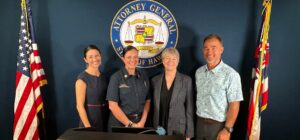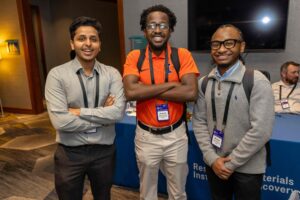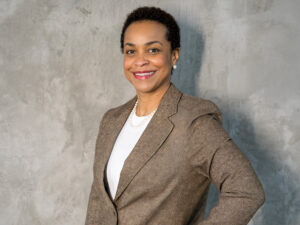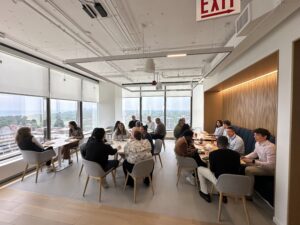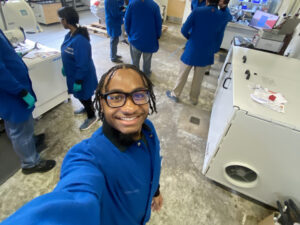Watch Now: About the Center for Advancing Safety of Machine Intelligence (CASMI)
Northwestern Engineering’s Todd Murphey and CASMI project Principal Investigator Leilani Gilpin attend a Governance Advisory Committee meeting in the still above. Hit the play button to learn more about this partnership between Northwestern University and the Digital Safety Research Institute.
Read more: CASMI celebrates launch with panel discussion, ceremony
From facial recognition to self-driving cars to smart homes to medical diagnostic systems, machine learning (ML) is the basis for transformational technologies we encounter every day. Yet despite the ubiquity of ML-driven applications, we still don’t fully understand the ramifications of this digital reality on our lives and communities.
Faculty, students, and industry professionals came together on April 8 to celebrate the launch of Northwestern’s Center for Advancing Safety of Machine Intelligence (CASMI). In partnership with the Digital Safety Research Institute (DSRI) at UL Research Institutes. CASMI will lead a wide-ranging research network to evaluate the human impacts of intelligent technologies and develop best practices for the design, development, and evaluation of systems to help ensure they are safe, equitable, and beneficial to all.
“We are now in a world where the technologies of intelligence are having impact absolutely everywhere,” said Kristian Hammond, CASMI director and Bill and Cathy Osborn professor of computer science at Northwestern Engineering. “If we don’t understand the science behind that impact, we will not be able to guide it, and make sure that the technologies will be safe and beneficial for individuals and society.”
A ceremonial ribbon cutting on the third floor of Mudd Hall kicked off the event, which featured remarks by Hammond and representatives from Northwestern University and UL Research Institutes.
Milan Mrksich, vice president for research at Northwestern, said CASMI’s goals align with the University’s overall research mission and focus on impact.
“Impact means bringing our basic and fundamental studies to the point where they benefit society and make the world a better place,” said Mrksich, the Henry Wade Rogers professor of biomedical engineering and professor of chemistry and of cell and developmental biology. “That’s done through translation and through affiliations with our corporate partners, which provide us with knowledge, understanding, and guidance about the most important problems that need to be solved with the best new ideas. This center and having UL Research Institutes as a partner to develop those ideas is going to be a tremendous societal benefit and will drive a lot of science and recruit a great community to Northwestern.”
Terrence R. Brady, president and CEO of UL Research Institutes, explained that digital intelligence is a relatively new area of focus for the 128-year-old company.
“Digital security and AI are critically important new areas where we need to be involved, because the internet and decision-making technologies are now so deeply embedded in our everyday lives,” Brady said. “We want to drive impact — improvement in digital security and safety for all of us, for our families — and I believe this partnership is one of the most important ways we can make a difference. We all have an opportunity together to chart a safer, smarter, and more ethical course forward.”
Northwestern Engineering Dean Julio M. Ottino connected the intersection of ethics and the unplanned, unexplored impacts of artificial intelligence (AI) to his research in complex systems and nonlinear dynamics and chaos.
“I can recognize a good, creative idea when I see one,” Ottino said. “And this is really a new idea in the spectrum of how universities interact with the corporate world.”
Christopher J. Cramer, senior vice president and chief research officer at UL Research Institutes, discussed the trailblazing cooperative agreement that established CASMI.
“Our approach is not typical for industry working in universities. I’m grateful for the way we have set up both the governance and the leadership so that we can recruit the best ideas from around the globe,” Cramer said. “We have an advisory board that includes people from industry as well as important contributors and developers of commercial products. I think the future looks incredibly bright, and I’m looking forward to cutting that ribbon and seeing the trains take off.”
Samir Khuller, Peter and Adrienne Barris Chair of computer science at Northwestern Engineering, noted the great opportunities for collaboration across the department that CASMI will yield, particularly for students.
“These types of partnerships give students the experience of seeing the real-life problems that they will encounter after they leave Northwestern,” Khuller said.
Khuller also underscored the complexity of machine learning and artificial intelligence.
“Machines are thinking and evolving. And safety in digital systems is complicated,” Khuller said. “If you open the hood of a car, you might not fully understand what every component does, but you can see pipes and tubes and their connections and it’s easy to get a grasp of the complexity. But with digital systems, it’s more like a black box. You click a button, software gets downloaded, interesting things begin to happen. And being able to delve deeper into what’s going on is critical.”
PUBLISHED

